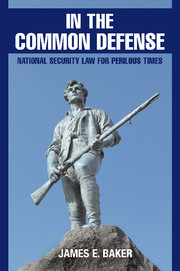Book contents
- Frontmatter
- Contents
- Acknowledgments
- Abbreviations
- Introduction
- 1 Perilous Times: Describing the Threat
- 2 The Meaning of National Security
- 3 National Security Law
- 4 Constitutional Framework
- 5 Electronic Surveillance: Constitutional Law Applied
- 6 National Security Process
- 7 Intelligence
- 8 Use of Military Force
- 9 Homeland Security
- 10 The National Security Lawyer
- Attachments
- Notes
- Index
3 - National Security Law
Published online by Cambridge University Press: 26 July 2009
- Frontmatter
- Contents
- Acknowledgments
- Abbreviations
- Introduction
- 1 Perilous Times: Describing the Threat
- 2 The Meaning of National Security
- 3 National Security Law
- 4 Constitutional Framework
- 5 Electronic Surveillance: Constitutional Law Applied
- 6 National Security Process
- 7 Intelligence
- 8 Use of Military Force
- 9 Homeland Security
- 10 The National Security Lawyer
- Attachments
- Notes
- Index
Summary
Law is essential to national security in three ways. Law enables our security. It shields our liberty. And it provides the process and framework within which to evaluate the efficacy and legality of our efforts.
LAW AND SECURITY
The United States may not stop “the next attack.” We may be unable to stop the next attack, even if we were better prepared to do so; even if we made the societal shifts necessary to do so. If we do prevent a catastrophic attack, it will be through the effective, hard, and creative use of the national security tools – intelligence, the military, law enforcement, and diplomacy.
Each tool is a product of law. The law defines the thresholds for their use, and the process, if any, predicate to their use. These are, of course, the same tools available for addressing the daily grist of national security: nonproliferation, Middle East stability and peace, great power rivalry, and disease epidemics.
Some national security law permits, by authorizing the president to take certain actions. The International Economic Emergencies Act (IEEPA), for example, authorizes the president to freeze and seize financial assets in response to threats to the national security, as well as to regulate financial transactions with foreign states and entities, such as North Korea, Iran, and Syria, or individuals associated with terrorism. Other laws prohibit conduct. For example, the National Security Act prohibits the Central Intelligence Agency from undertaking internal security functions.
- Type
- Chapter
- Information
- In the Common DefenseNational Security Law for Perilous Times, pp. 23 - 31Publisher: Cambridge University PressPrint publication year: 2007



